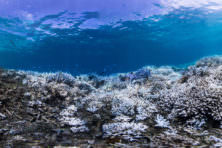Science Snippet: Deep Blue Gold at Blue Lake
- Share
- Tweet
- Pin
- Share
Sitka, Alaska, is the site of Blue Lake, one of the world’s greatest deposits of a kind of deep blue gold. The lake is called blue gold because it holds trillions of gallons of pure, drinkable water, even without treatment. Fed by glaciers and snowpack, the value of the lake may approach that of gold sometime in the future as the world faces an increasing scarcity of drinkable water. It’s almost inevitable that there will be future wars based on demands for water, not oil. While oil isn’t absolutely essential to sustain life, freshwater is. Some countries already face grave freshwater shortages, while others have an abundance. The top freshwater-rich countries are Iceland, Guyana, The Congo, Suriname, Bhutan, New Guinea, Gabon and Canada. Water-poor regions include much of northern and eastern Africa, South Africa, the Middle East, India, parts of Russia and China, and the western U.S. Distributing freshwater from the haves to the have-nots is a major problem, one that is confounded by the doubling of global water consumption every 20 years. In the case of Blue Lake, two American companies have purchased the rights to transfer a billion gallons of freshwater a year. The water will be collected by pipeline and ultimately transported by tanker ships to Mumbai (for sale in the Middle East) or marketed in India. If global warming is a reality, the worldwide need for freshwater will continue to grow, become greater, and sometime in the future we may be as concerned about freshwater to drink as about oil to fuel our cars. (Ryan Tracy, in Newsweek, Oct. 18, 2010; data from Univ. of Kassel, Pacific Institute, United Nations)


